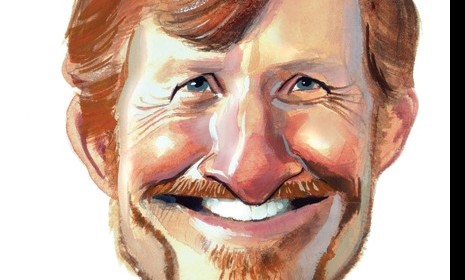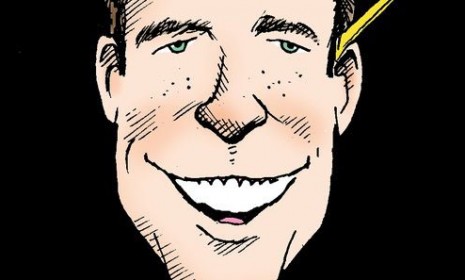The wrong jobs summit
The White House's economic policies, which were calibrated to address a less severe crisis than the one we've en
A free daily email with the biggest news stories of the day – and the best features from TheWeek.com
You are now subscribed
Your newsletter sign-up was successful
The White House is hosting a jobs summit this week. I, however, cannot but think that it is the wrong jobs summit—that it will be the wrong people talking about the wrong things.
Let me back up. Ever since the 1930s, economists trying to analyze the determinants of spending have focused on two of the economy’s markets: the market for liquidity and the market for savings.
The market for liquidity—the money market—matches the supply of readily spendable purchasing power in the economy (cash, checking account balances, credit lines) with the demand of households and businesses to hold some of their wealth in the form of readily spendable purchasing power. Supply and demand in this market is influenced by interest rates and the flow of spending.
The Week
Escape your echo chamber. Get the facts behind the news, plus analysis from multiple perspectives.

Sign up for The Week's Free Newsletters
From our morning news briefing to a weekly Good News Newsletter, get the best of The Week delivered directly to your inbox.
From our morning news briefing to a weekly Good News Newsletter, get the best of The Week delivered directly to your inbox.
The market for savings—usually called “the bond market”—matches households wishing to boost the value of their savings with businesses seeking capital to expand their productive capacity. Interest rates are crucial here, as well.
At first glance, it seems there are three variables at play: spending, income, and interest rates. But when we recognize that everyone’s spending is someone else’s income, we see that there are really only two variables—that the economy will settle at that level of interest rates, spending, and income where supply equals demand in the market for liquidity and in the market for savings.
We now have a framework for managing the economy. For the government to boost jobs, it must to do something to change the balance of supply and demand in either the market for liquidity or the market for savings. In general, the central bank—the Federal Reserve—acts to tweak supply and demand in the market for liquidity. The president and Congress act to tweak supply and demand in the market for savings. But they must make sure that whatever spending, income, and job-stimulating effect they create by intervening in one market is not undone by changes in the other market.
Right now, if you ask the decisive members of congress—by which I mean the Blue Dog Democrats in the House, or the most conservative Democrats and most liberal Republicans in the Senate —why the president and the Congress are not doing more to reduce unemployment and boost spending and income, the answer you’ll get is ... well, you probably wouldn't get an intelligible answer.
A free daily email with the biggest news stories of the day – and the best features from TheWeek.com
But if you did get an explanation for the lack of congressional action it would go something like this: Attempts to move supply and demand in the market for savings in order to boost spending would (a) increase the national debt burden on future taxpayers and (b) lead to a large decline in bond prices and a boost in interest rates. Why? Because businesses would try to increase their liquidity to support higher spending, driving up interest rates, which, in turn, would cause businesses to cut back on investment, thus neutralizing most or all of the stimulative policies.
Similarly, if you were to ask the Federal Reserve why it isn’t doing more to reduce unemployment and boost spending and income, the answer you would get is this: Spending is in no way constrained by a shortage of liquidity. We have already done all we can do, indeed we have “flooded the zone” with liquidity. As a result, the Fed is disinclined to pursue additional tweaks of supply and demand in the market for liquidity because it fears such efforts would fuel destructive inflation in the future without boosting employment and spending in the present.
Both of these arguments are comprehensible; each might well be true. But they cannot both be true at the same time. Either the economy is so awash in liquidity that the Federal Reserve cannot do much to boost spending—in which case additional spending by the government won’t generate any substantial rise in interest rates. Or additional government spending will crowd out investment as businesses scramble for liquidity and interest rates rise—in which case the economy is not awash in liquidity, and quantitative easing by the Federal Reserve could do a lot right now to boost spending and employment.
It appears that what we have here is a failure to communicate.
In truth, that is nothing new on this front. It was clear, for example, by Feb. 17 of this year, the day Obama signed the stimulus package, that the economy was in much worse shape than earlier projections had supposed. The administration’s policies were targeted at an economy in which the current—December 2009—unemployment rate was projected at 7.8 percent, with a decline to 6.9 percent projected by December 2010.
But we do not live in that world. We live in a world in which the unemployment rate this month is likely, in the final data, to come in at 10.4 percent, and in which the unemployment rate in December 2010 may well exceed 9.6 percent. All of this was known, or suspected, on Feb. 17. But the High Politicians and High Spinmasters of the Obama administration chose not
to communicate that grim news. The problem is not that the administration’s policies have not performed as expected; they have, more or less. The trouble is they were devised to treat a bad crisis. And we were living through an even worse one.
Thus we need a jobs summit right now. We need the White House's National Economic Council and key congressional “centrists” on one side and the Federal Reserve Open Market Committee on the other to meet. Those two groups seem to have very inconsistent views of the economic situation. They seem to be working at cross-purposes. Something has to give. If they could reach agreement on whose view of the economy is likely correct, then a rescue plan—entailing either more government spending or greater liquidity—would become obvious.
Until that “jobs summit” is convened, others are moot.
Brad DeLong is a professor in the Department of Economics at U.C. Berkeley; chair of its Political Economy major; a research associate at the National Bureau of Economic Research; and from 1993 to 1995 he worked for the U.S. Treasury as a deputy assistant secretary for economic policy. He has written on, among other topics, the evolution and functioning of the U.S. and other nations' stock markets, the course and determinants of long-run economic growth, the making of economic policy, the changing nature of the American business cycle, and the history of economic thought.
-
 Political cartoons for February 20
Political cartoons for February 20Cartoons Friday’s political cartoons include just the ice, winter games, and more
-
 Sepsis ‘breakthrough’: the world’s first targeted treatment?
Sepsis ‘breakthrough’: the world’s first targeted treatment?The Explainer New drug could reverse effects of sepsis, rather than trying to treat infection with antibiotics
-
 James Van Der Beek obituary: fresh-faced Dawson’s Creek star
James Van Der Beek obituary: fresh-faced Dawson’s Creek starIn The Spotlight Van Der Beek fronted one of the most successful teen dramas of the 90s – but his Dawson fame proved a double-edged sword
-
Issue of the week: Who killed the Twinkie?
feature The seemingly imperishable Twinkie has finally met its match, and its name is Big Labor.
-
Issue of the week: Apple’s patent victory over Samsung
feature Apple's “sweeping victory” is among the biggest intellectual-property triumphs on record.
-
Issue of the week: Goldman Sachs’s ‘toxic’ culture
feature Greg Smith’s stinging public resignation from Goldman Sachs landed on Wall Street “like a bomb.”
-
Issue of the week: Can a mortgage deal revive housing?
feature Five big banks reached a settlement with state and federal officials to pay $26 billion to offset some of the damage caused by their misdeeds in the foreclosure crisis.
-
Issue of the week: Europe gets downgraded
feature Standard & Poor's lowered the credit rating for nine European nations, indicating that Europe has not yet convincingly dealt with the debt crisis.
-
 Tom Toles: Cartoonist of the Year
Tom Toles: Cartoonist of the Yearfeature Meet the winner of The Week's Cartoonist of the Year award
-
 Cartoonist of the Year finalists
Cartoonist of the Year finalistsfeature A brief look at this year's nominees
-
Issue of the week: Calling out the crash’s culprits
feature The Senate's Permanent Subcommittee on Investigations has just published its 635-page report on the financial crisis.